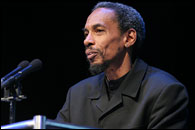Born: 1st May 1907
Crossed over : 5th August 2007
Oliver White Hill earned his undergraduate degree from Howard University and graduated from Howard University School of Law in 1933. Hill was a classmate, rival, and close friend of Thurgood Marshall in law school. They remained close throughout Marshall's life, working together on numerous cases for the NAACP and LDF, most famously the Brown cases at the Supreme Court. Hill was inspired by Charles Hamilton Houston and his vision of lawyers as transformative social engineers. Hill says in his typical direct and unaffected manner, "I went to law school so I could go out and fight segregation." (Kluger, Simple Justice, p. 471)
Hill practiced law in Virginia, working at first within the seperate-but-equal framework of Plessy on a broad equalization campaign for better pay, transportation, and facilities for African American teachers and students. Working with Thurgood Marshall, William H. Hastie, and Leon A. Ranson, Hill won a critical case in 1940 ordering equal pay for black and white teachers. Alston v. School Board of Norfolk, Va., 112 F.2d 992 (4th Cir.), cert. denied 311 U.S. 693 (1940).
In 1943 Hill joined the Army. Upon returning from service in Europe, Hill continued his struggle. He won the right for equal transportation for school children in the Virginia Supreme Court as he had won the right for equal pay for teachers in the 4th Circuit. In 1948 Spottswood Robinson was named special NAACP counsel in Virginia. Hill and Robinson filed dozens of cases against school districts throughout the state, with as many as 75 pending at one time. (Kluger, p. 473)
In 1950 the NAACP decided to stop filing the equalization suits and instead attack the entire premise of the system head-on. The record of massively unequal systems, of constant resistance even to court ordered equalization, and of the general intrangisence with respect to changing the system was important for supporting the frontal attack that was now underway. Seperate but equal was demonstrably not working or workable.
The change of tactics led to Hill and S. W. Robinson III being the lead counsel in the Virginia case of Davis versus County School Board of Prince Edward County, which was ultimately consolidated with Brown at the Supreme Court.
He was the first African American on the City Council of Richmond, Virginia, a position he took in 1949.
In July 2000, Hill received the American Bar Association Medal because, in the words of William G. Paul, the President of the ABA, “Oliver Hill has toiled for more than two generations to make equality and justice living realities for all the people of the United States.”
On August 11, 1999, President William J. Clinton, awarded Hill the highest honor the nation can bestow, the Presidential Medal of Freedom. Upon presenting the award, President Clinton said of Mr. Hill:
Throughout his long and rich life, he has challenged the laws of our land and the conscience of our country. He has stood up for everything that is necessary to make America truly one, indivisible and equal.
MAY THE ANCESTORS BE PLEASED



0 Comments:
Post a Comment
<< Home